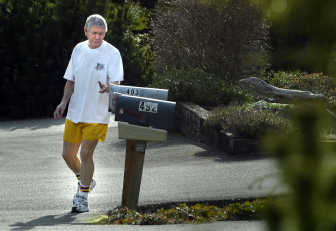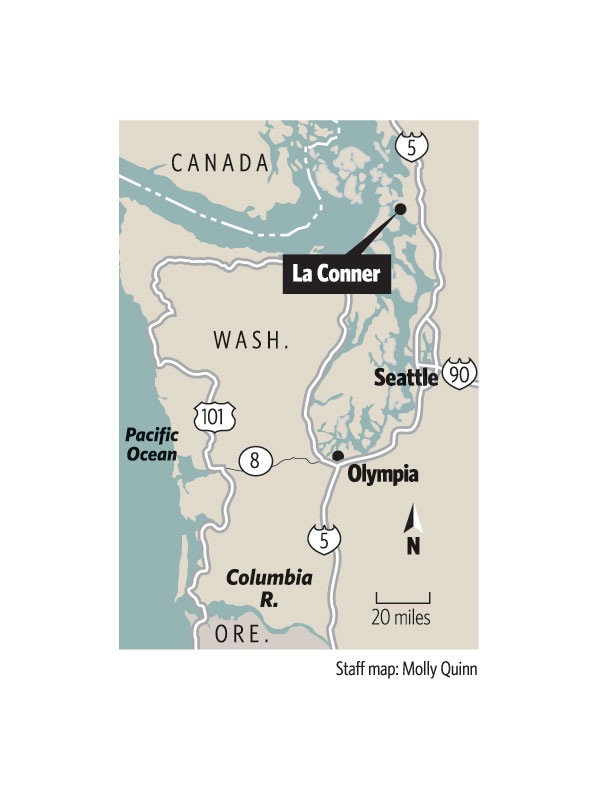By John Stucke
Spokesman Review
January 27, 2008
http://www.spokesman.com/sections/diocese/?ID=229417
[A reposting by the Spokesman review, identical to a previous post, except that this version includes a photo of O'Donnell and a summary at the top of the article. Both versions also include a link to the Spokesman Review's comprehensive coverage of the crisis and bankruptcy in Spokane.]
LA CONNER, Wash. – In this idyllic town nestled near the Puget Sound and surrounded by tulip fields, residents of the Shelter Bay neighborhood are in an uproar: They have inherited a Spokane problem that has left them in disbelief. Patrick G. O'Donnell, a former priest in the Spokane Catholic Diocese and notorious pedophile who has admitted to molesting dozens of teenage boys over three decades, has lived quietly among them for the past four years.
Now 65, O'Donnell smiles and says hello to the children playing in front yards or walking along the street and lives in a house with pleasant views of a community park and playground.
Neighbors haven't seen any inappropriate contact between O'Donnell and children, they say, and O'Donnell said in recent court depositions that he hasn't molested any children for two decades.
Yet his history is upsetting to people living near him. O'Donnell is named in 66 of the 176 claims filed alleging sexual abuse by priests in the diocese, more than any other single priest, and the diocese considers him "credibly accused."
 |
| Former Spokane priest Patrick O'Donnell walks to his mailbox Friday at his home in La Conner, Wash. O'Donnell, who molested dozens of boys in Spokane, was removed from the Catholic priesthood in 1986 but never formally charged.The Spokesman-Review Photo by Brian Plonka |
"It's unbelievable this can happen," said Jennifer Smith, who lives down the street from O'Donnell.
Some newer residents of the neighborhood said they checked with sex-offender registries before buying their homes – a parental due diligence effort to help ensure they were moving to a place safe for their children.
Now they are stunned by a system for tracking offenders that they say is imprecise, unreliable and, ultimately, inadequate.
Police never arrested O'Donnell. Instead, the Catholic hierarchy decades ago attempted to treat his pedophilia without disclosing his actions.
It was a failed strategy that contributed to the bankruptcy filing by the Roman Catholic Diocese of Spokane. Last year, the diocese agreed to pay $48 million to those claiming sexual abuse by priests.
There are no complaints of sexual misconduct by O'Donnell after 1985, and O'Donnell has asserted in recent court depositions that he has not molested boys in decades.
Yet some parents and officials in La Conner worry that pedophiles can't be cured, and they are frustrated nothing else can be done.
After learning of O'Donnell's past this month through inquiries from reporters, neighbors began talking to one another and ultimately contacted The Spokesman-Review.
Last week, representatives of more than a dozen families met with a reporter to discuss their concerns.
'I'd like to tell him to leave'
The Shelter Bay neighborhood was established as a private retirement community years ago on the Swinomish Indian Reservation, but today the modest neighborhood is open and bustling with young families.
"We're going to make sure everybody here and in the surrounding communities is aware that (O'Donnell) is here," said Miguel Rivas, a teacher with two young boys.
Keith Hunter, a fifth-grade teacher, is ready to advocate for changes to state laws that would require admitted pedophiles without convictions to register as sex offenders.
"I just look at the fact that here's a man who has never been brought to justice and remains free to roam," Hunter said. "He has admitted to being a serial pedophile, and yet there's nothing in place to track him."
 |
| Map: La Conner, Wash. |
O'Donnell's phone number is unlisted.
He didn't answer his door upon repeated visits to his home, nor did he respond to a handwritten note left at his front door that included a request to call a reporter.
"I'd like to tell him to leave here," said Smith, the neighbor, "but it's not that easy. You can't just move your trash to another community."
O'Donnell paid $225,000 for his home in April 2003, according to Skagit County property records. Those who live nearby say he has been a quiet neighbor. Rhododendrons grow in front.
Though his home is on the Swinomish reservation, there is no record of O'Donnell working for or volunteering with tribal services that help youth, said John Stephens, programs administrator for the Swinomish Tribe.
Victims in Spokane
O'Donnell was born in 1942 in Quincy, Ill., and moved to Spokane as a 3-year-old. He attended parochial schools and graduated from Gonzaga Prep in 1960.
He earned a degree from Gonzaga University and joined the Army.
He earned a master's degree in counseling from Gonzaga in 1971 and was later ordained a priest.
By that time, he has admitted in court depositions, he was molesting boys in Spokane. He said in the depositions that he had always been attracted to teenage boys.
O'Donnell was deposed in November 2007 in a civil case filed by more than two dozen of his accusers. That lawsuit had been stayed during the diocese's nearly three-year-long bankruptcy, but now Timothy Kosnoff, the attorney representing the accusers, is hoping for a November 2008 trial.
O'Donnell began therapy for his sexual conduct in the early 1970s while serving as a priest in Spokane.
He was assigned to Assumption Parish in 1974 and stayed for two years. In the summer of 1976, after molesting boys at Assumption Parish and skinny-dipping regularly with many others, O'Donnell was told by then Bishop Bernard Topel to leave town immediately, according to the court depositions. O'Donnell said he left within days and began therapy in Seattle.
Yet even while in treatment, O'Donnell continued to have sexual contact with teen boys that he didn't tell the therapist about.
"I was very embarrassed and felt bad and didn't want him to know," O'Donnell said in the deposition. "I felt sinful, I felt that I wasn't a good person, wasn't a good priest."
He returned to Spokane and served at Our Lady of Lourdes Cathedral. He said he was not closely supervised.
According to the deposition, he again had contact with teenage boys, playing basketball with them and taking boys on boat rides and other activities.
He admitted molesting four boys in the summer of 1980, the deposition says.
O'Donnell said in the deposition that he stopped having sexual contact with boys that fall.
"I just had some sort of a realization. It just kind of hit me," he said in the deposition. "I don't know exactly what led to it. I think part of it might have been that I came pretty close to dying that year. But otherwise, maybe just I finally realized when these parents complained that this was just really wrong and I needed to stop."
O'Donnell didn't elaborate in the deposition on his illness, but said it required hospitalization.
Even after the illness and his resolve to quit molesting boys, O'Donnell said in the recent deposition that he continued to go skinny-dipping and have naked hot tub gatherings with teenage boys while serving in Rosalia's St. John's parish. He said those activities weren't sexually motivated and he didn't molest any of the participants. O'Donnell was removed from the Rosalia parish in 1985.
He said he laicized – or removed himself from the priesthood – in 1986.
That's the year O'Donnell's actions were reported for the first time in The Spokesman-Review.
After that, O'Donnell practiced psychology in the Bellevue area, treating patients age 12 and older. He lived in a handsome home with an indoor swimming pool in the upscale Yarrow Point community.
In the deposition, he said that he continued having naked hot tub gatherings perhaps until 2001 but that they did not involve sexual activity.
He sold his home for $570,000 in March 2003.
The Washington state Board of Psychology began investigating O'Donnell in 2002 after complaints from some of those he victimized while he was a priest.
O'Donnell surrendered his license to practice psychology in January 2004.
Push for legislation
O'Donnell cannot be charged for the past abuses. The statute of limitations has expired.
"O'Donnell should be held up under the spotlight as a glaring example of what's wrong with our system," said Jennifer Dalton, who lives up the street from him. "O'Donnell has not only been a Spokane problem, because he can step into communities unidentified and unmarked at any time, as he did with our neighborhood for several years without anyone's knowledge of his past."
O'Donnell's case has prompted former Spokane prosecutor Don Brockett to push for legislation to eliminate statutes of limitations for sex crimes committed against children.
Attorney Kosnoff, who represents O'Donnell victims, said that would be a good start.
"The best thing we can do to protect children is to warn them about the dangers," he said. "That's why we hammer on mandatory reporting requirements, because let's face it, the sex offender registry is catching only a tiny fraction of sexual predators."
He said the diocese should have reported O'Donnell to police when it learned of his molestations. That would have imprisoned him for life, Kosnoff said, and saved dozens of children from his sexual predations.
The diocese, as part of its bankruptcy settlement, is required to support the push to erase the statute of limitations.
Diocese attorney Shaun Cross said O'Donnell has caused much harm.
"It's difficult to even comprehend how much pain and suffering this man has caused his scores of victims and how much he has cost parishioners in Spokane," Cross said.
At the end of his deposition, O'Donnell offered the following statement:
"I have said something similar to this several times before, but I just want everybody to know that I'm very sorry for my misbehavior, my bad actions, for anything that hurt or might have hurt anybody, victims, other people involved in any way. I feel very bad, and I – I'm sorry.
"I'm trying to live my life as best I can, and I'm trying to make my contacts with others something that helps them to become better people. But I'm very sorry for my actions of the past years."
Such words offer little solace to his current neighbors.
"I'm going to tell everyone I know," said Mary Nelson, who works at a pediatric dental office. "I'd like to see him get put away, but that's not going to happen."
Added Julie Burgmeier: "This is a great place to raise a family, but we're frustrated that he has been here for four years and no one knew about it. We have to tell people about him and ensure that our children are aware of who and what he is."
Any original material on these pages is copyright © BishopAccountability.org 2004. Reproduce freely with attribution.